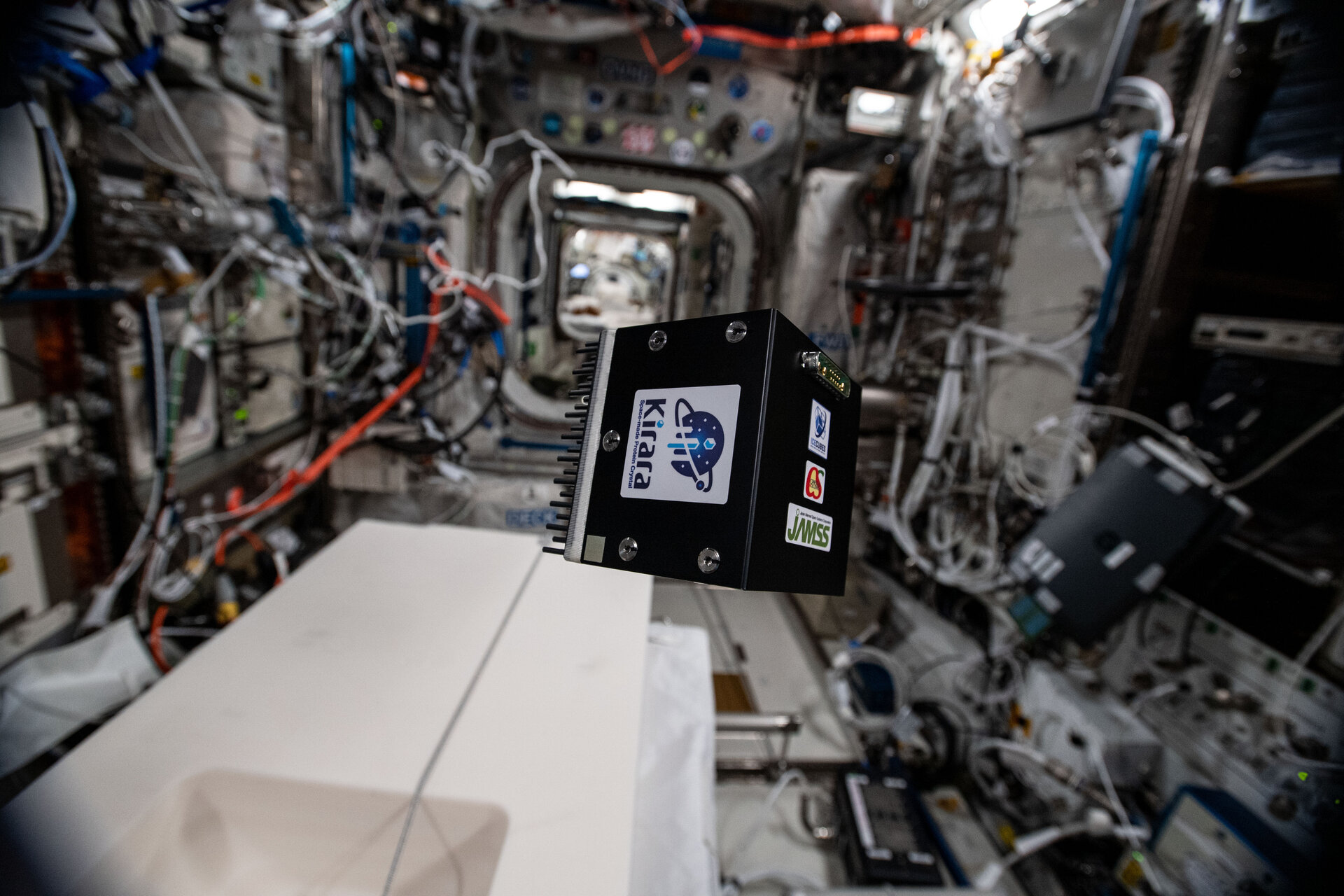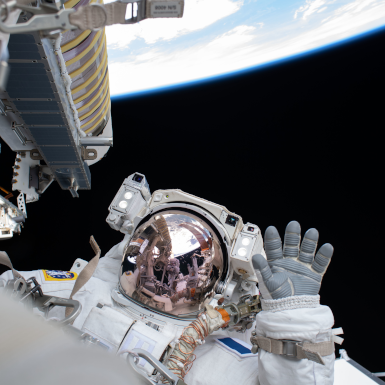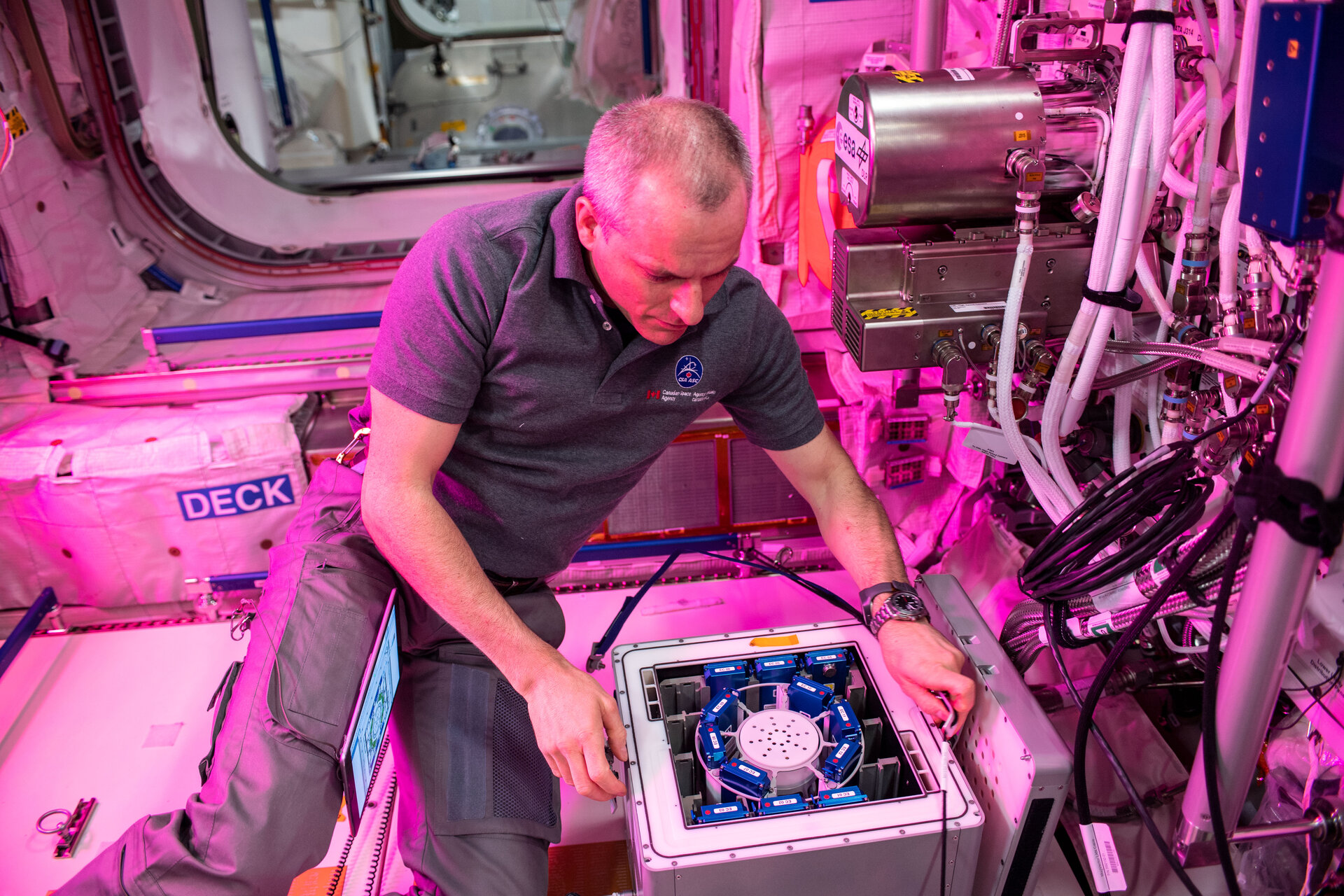Your Business in Orbit
Space can be the ideal environment to exploit a wide range of phenomena and physical processes that are not possible under the effects of gravity experienced on Earth, such as different fluid dynamics, material behaviour or cell biology. Besides microgravity, space offers extreme conditions, such as huge temperature differences and radiation, as well as an unobstructed vantage point for remote sensing or communication. All these characteristics can unlock benefits for commercial businesses on Earth in a wide range of sectors from energy to food and pharmaceuticals production.
Now, access to Low Earth Orbit (LEO) has become easier thanks to established space service providers operating onboard the International Space Station (ISS): ESA ISS Commercial Partners and other service providers offer unique services along with clear pricing policies, which cover the complete service chain from preparation, launch, operations onboard the ISS, to sample return. ISS facilities include both internal and external platforms – for a more detailed overview about existing ISS service providers and their ISS facilities, please visit the Business in Space Growth Network.
What We Offer
The Commercial Applications enabled by Space Environments (CASE) Open Call for Proposals supports the development of commercial services that benefit from microgravity and space environments.
CASE Feasibility Studies and Demonstration Projects are designed to assess, mature, and implement business concepts for new commercial services, products and applications that are enabled by existing space infrastructure related to human and robotic exploration. Eligible space infrastructure includes, for example, space-based facilities such as commercial services available aboard the International Space Station or, once available, future LEO and lunar infrastructure.
We offer funding and support to companies for business case assessment and spaceflight preparation as well as developing and piloting of new end-to-end services and products that benefit from space environments in Low Earth Orbit (LEO).
- Zero-equity funding
- Personal ESA consultant
- Technical & commercial guidance
- Access to our network of partners
- Credibility of the ESA brand
Entrepreneurs with promising business ideas that benefit from LEO can consider the following two mechanisms on their journey from a customer driven business opportunity to operational services:
CASE Feasibility Study
CASE Feasibility Studies provide a framework to identify, analyse, and define new potentially commercially viable services enabled by space environments.
Studies are customer/user driven and developments limited to the validation of critical assumptions regarding the desirability by envisaged customers, technical feasibility, or commercial viability of the proposed service.
CASE Feasibility Studies include:
- development and maturation of business cases including operational end-to-end service concepts enabled by the space environment
- assessment of the desirability by potential customers, technical feasibility, and commercial viability of these business cases
- preparation for the integrated service implementation and in-space demonstration during potential follow-on CASE Demonstration Project
- proof of concepts on ground to test the critical assumptions regarding desirability by customers, feasibility of the space and ground aspects, and viability of the proposed service
In case of successful results, a potential follow-on CASE Demonstration Project can be pursued.
CASE Demonstration Project
CASE Demonstration Projects are dedicated to the implementation of pre-operational demonstration services and validation with involved pilot customers/users.
The demonstration projects must be customer/user driven, technically feasible, and have a clear potential to become commercially viable.
CASE Demonstration Projects include:
- the development of the end-to-end solution for an operational pilot service
- the in-space demonstration and validation
- the end-to-end pilot service provisioning and validation with the envisaged customers and users in their operational environments
Summary of Funding Levels
| CASE Feasibility Study | CASE Demonstration Project | |
| Activity Cost | max. 500’000 EUR (limited to acceptable cost) |
case by case assessment (limited to acceptable cost) |
| ESA Co-Funding | ||
| Baseline | max. 50% of company’s cost | max. 50% of company’s cost |
| Micro, Small and Medium-Enterprises[1] | max. 80%[2] of enterprise’s cost | max. 80%[2] of enterprise’s cost |
| Universities and Research Institutes with no commercial interest in product/service |
max. 100%[2] of institute’s cost and max. 30% of activity cost |
max. 80%[2] of institute’s cost and max. 30% of activity cost |
| Industry Co-Funding | Remaining part of the cost to carry out the activity | |
[1] Enterprises fulfilling the criteria defined in the European Commission Recommendation of 6 May 2003 (2003/361/EC) or as updated.
[2] Depending on the funding level authorised by the related National Delegation(s).
What We Look For
- Attractive market opportunities and customer engagement
- Commercially viable service concepts
- Technically feasible solutions
- Added value of space environment in Low Earth Orbit
- Motivated teams with business and domain expertise, and a service provider enabling the access to space

How to Apply
To be eligible for funding, your team must be based in one of the following countries: 🇦🇹 Austria, 🇧🇪 Belgium, 🇨🇿 Czech Republic, 🇩🇰 Denmark, 🇪🇪 Estonia, 🇫🇮 Finland, 🇫🇷 France, 🇩🇪 Germany, 🇬🇷 Greece, 🇭🇺 Hungary, 🇮🇪 Ireland, 🇮🇹 Italy, 🇱🇹 Lithuania, 🇱🇺 Luxembourg, 🇳🇴 Norway, 🇵🇱 Poland, 🇵🇹 Portugal, 🇷🇴 Romania, 🇸🇪 Sweden, 🇨🇭 Switzerland, or the 🇬🇧 United Kingdom. Teams can involve non-European entities, but their contribution to the activity cannot be funded by ESA.
- Step 1: Activity Pitch Questionnaire
-
The Activity Pitch Questionnaire allows you to present your business idea in a reduced, standardised pitch. It helps us to quickly assess your idea and decide on the way forward.
- Download the latest Activity Pitch Questionnaire.
- Prepare your pitch and optionally consult with an ESA Business Applications Ambassador.
- Submit your pitch
Upon submission of an Activity Pitch Questionnaire:
- We may share the submitted Activity Pitch Questionnaire with National Delegations for coordination purposes.
- We will assess your pitch.
- We will inform you about the results and next steps.
Note:
- For Step 3 (Full Proposal) you need authorisation from National Delegations of countries in which your and your partners’ organisations reside. We recommend liaising with them early.
- Step 2: Outline Proposal
-
If we accept your Activity Pitch Questionnaire, we will invite you to prepare an Outline Proposal for a CASE Feasibility Study or Demonstration Project.
- Download the Outline Proposal Template for a CASE Feasibility Study or CASE Demonstration Project.
- Prepare your proposal, elaborating on your pitch.
- Submit your Outline Proposal
1 year from APQ submission.
Upon submission of an Outline Proposal:
- We may involve external experts in the proposal evaluation to coordinate activities within ESA Member States and the European Union.
- We will assess your proposal and may ask you to address clarification points.
- If all clarification points are sufficiently addressed, we will prepare a project dossier and request approval from our steering board, which meets quarterly.
- We will inform you about the results and next steps.
- Step 3: Full Proposal
-
If we invite you to submit a Full Proposal:
- Register your team on esa-star Registration today! If your team is made up of more than one organisation, each entity must register.
- Download the official tender documents from esa-star Publication (Tender Action Number 1-11111).
- Prepare your proposal using the official tender documents and reach out to your National Delegation to obtain a Letter of Authorisation.
- Submit your Full Proposal
via esa-star Tendering within 8 months from an acceptable Outline Proposal.
Upon submission of a Full Proposal:
- An independent board will evaluate your proposal against criteria set out in the tender documentation.
- We may ask you to address clarification points identified during proposal evaluation and invite you to a negotiation meeting.
- Upon successful negotiation, we will send you a contract for signature and agree the project kick-off.




